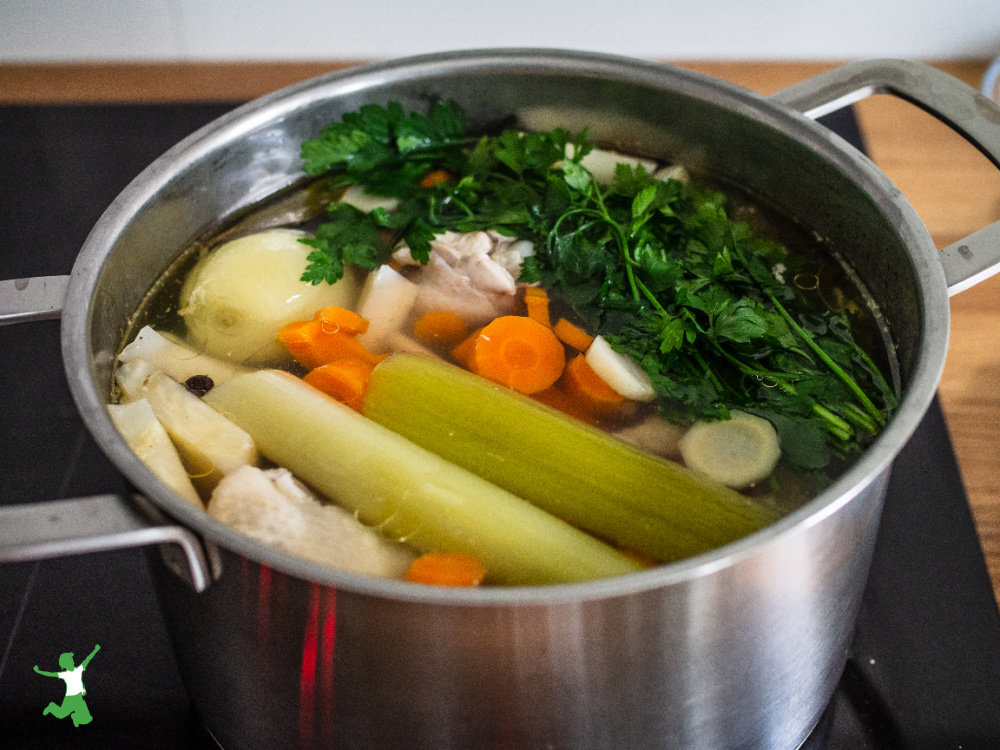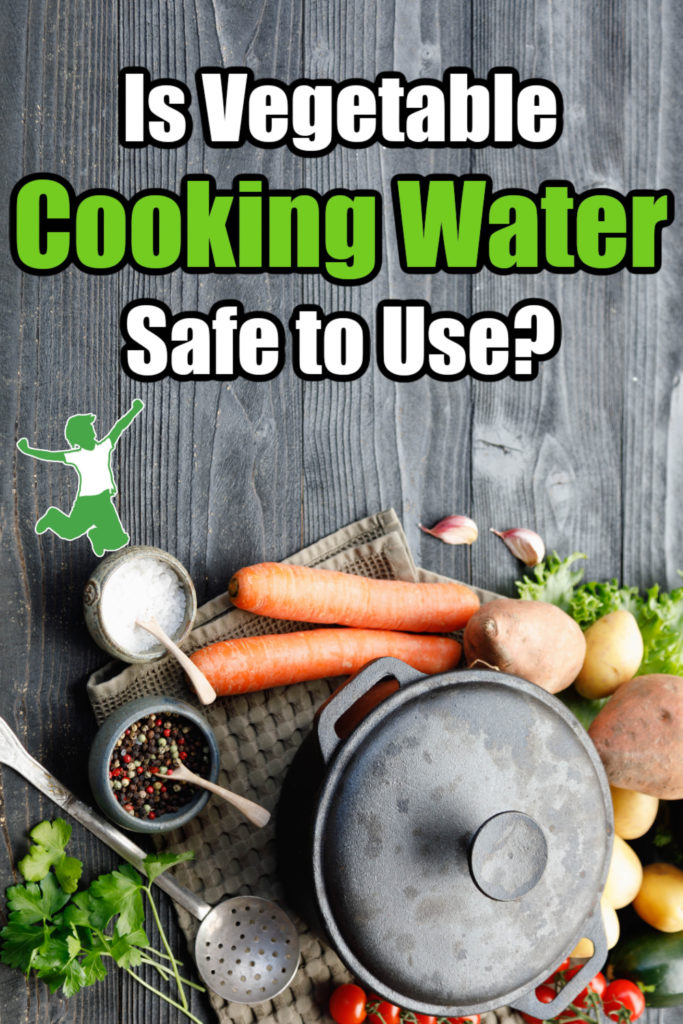Guidelines for when vegetable cooking water is safe to use and when it is best to toss due to nitrites, residues or anti-nutrients that can do more harm than good.

Adelle Davis popularized the practice of saving vegetable cooking water during the Leave it To Beaver era of the American 1950s.
She reasoned that any vitamins and minerals lost from cooking the vegetables would end up in the water.
This supposedly nutrient-rich cooking water could then be added to homemade soups or sauces with the nutrition benefiting those that consumed them.
This notion took hold and has not let go to this day.
Unfortunately, reserving vegetable cooking water can do more harm than good.
Consider the reasons below before you use it in your dishes. How to know your veggie cooking water is safe is discussed as well.
Chemical Residues
If the vegetables that are cooked are not organic, pesticides and nitrites from commercially produced fertilizers can end up in the cooking water.
Even low to no spray veggies such as asparagus would not be safe.
These crops are still typically fertilized with commercial preparations that are high in nitrites.
Anti-Nutrients
Cooking cruciferous vegetables such as broccoli, cauliflower, cabbage, Brussels sprouts, and kale would add goitrogenic (thyroid blocking) substances to the cooking water which should be discarded.
Water used to boil potatoes would contain chemicals called hemagglutinins that disrupt red blood cell formation.
Dark green, leafy vegetables such as beet greens, raw spinach, and chard contain oxalic acid that blocks calcium and iron absorption.
This irritating substance also can cause distress to the sensitive mucous membranes in the mouth and intestinal tract and contributes to the formation of kidney stones.
Consuming raw crucifers or dark, leafy greens is not an alternative either as the substances that cause problems when in the cooking water also cause problems if consumed directly with the vegetable in an uncooked state such as a raw green smoothie.
Legumes & Beans
For the last few years, the vegan community has popularized the trend of reusing legume cooking water, particularly from chickpeas.
This isn’t a safe practice even if the legumes or beans are soaked before cooking.
This soapy, slimy water is called aquafaba and is used as an egg replacement, particularly in dessert recipes. It whips up foamy just like egg whites.
Published research reveals that chickpea cooking water contains saponins, a potent anti-nutrient that contributes to leaky gut, which is at epidemic levels today.
It is also not advisable for pregnant women to consume this substance as it is a miscarriage risk.
Safe Vegetable Cooking Water
Do you really want to use vegetable cooking water as a frugal tool in your kitchen routine?
Consider this list of some of the most popular vegetables below. They are safe to use for that purpose.
- carrots
- turnips
- potatoes (peelings)
- parsnips
- beets
- celery
- organic pumpkins and squash (including zucchini)
- organic onions, leeks, and garlic
- nightshades (tomatoes, eggplant, and peppers among a few others)
For example, this potassium broth recipe uses vegetables simmered in water from the list above.
Simple Guidelines To Follow
Do you find it confusing to remember the distinctions between which organic veggies are safe to use and which are not?
Or, do you buy some veggies organic and others conventional?
If so, it is best to just adopt the practice of not using the cooking water at all.
This is particularly true if you tend to mix veggies together when cooking them.
Never Use Veggie Water for Baby Food
It is of particular importance NOT to use vegetable cooking water for use in pureeing homemade baby food.
Use pure filtered water instead, or if baby is old enough, some homemade bone broth or meat stock.
Final Caution to Consider
One final word of caution.
All vegetables tend to form nitrates after cooking and during storage. These nitrates can transform into strong carcinogens in the intestines.
Hence, it is best to avoid refrigerating and reheating vegetables, particularly leafy, green vegetables which concentrate nitrates when grown commercially.
References
Nourishing Traditions Cookbook









I think this is one of the most irresponsible articles I have ever read. In a day and age when 95 percent of Americans are eating nothing but processed crap, here we have someone scaring the crap out of us about … vegetable stock? This is even worse than Joseph Mercola writing incessant idiocy warning us against eating fruit. Luckily you don’t have nearly the audience that Mercola has, warning us against LEAFY GREENS?? Seriously? Do just a LITTLE bit of research instead of parroting the articles warning us about oxalates. Are there ANY studies showing a correlation between kale eating and kidney stones? Are there ANY studies correlating the consumption of kale and thyroid issues? No, and no. Kale and spinach are GOOD FOR YOU, hello? Just as with any food on the planet, if you eat pounds of leafy greens every day, you might find yourself with some nutritional issues– a balanced diet is important– but kale and spinach have endless positive health benefits. I’m not going to disagree that we should be buying organic vegetables , but I’d way rather see someone making vegetable stock with non-organic veggies than eating, say, 90 percent of the other stuff you can buy at a basic grocery store. This article is irresponsible and it’s quite disturbing to me that I saw it posted three times on Facebook. Use your noggins, folks, and please ignore this stupidity.
I used to use it to water plants. Also the water that I hard boil eggs in.
Yes, I use bone broth as base. I also add carrots, celery and onion while making the bone broth. Then, I’ll add more veggies to cook in the broth for whatever soup I’m making. Is there a danger in this?
I’ve heard of this before, but then I’ve also heard of people boiling certain vegetables to make a potassium-rich soup which is supposed to be health-promoting.
And what about slow-cooked, hearty vegetable soups or veggies as part of a stew? Is that unhealthy? Thanks.
What about soup that is made from vegetables cooked in the liquid that eventually IS the soup? I am really confused and concerned about this as I have multiple auto-immune diseases and never seem to get well… no matter how ‘healthy’ I eat. Could my soup be making me sick???
What about freezing lightly-blanched kale and swiss chard? I always discard the blanching water. I occasionally add some frozen greens to soups. Does freezing inhibit nitrate production?
Soup base comes from homemade bone broth not vegetable cooking water. If you want a vegetable stock base, use miso paste.
Sarah I’ve not really understood this concept. Is this not technically what soup is? And if so, does it not make soup any good then?
I am just reading Tamar Adler’s Everlasting Meal. She highly recommends cooking your vege’s in advance, and then using them as you go during the week. She loves reusing water from vege’s or pasta, and I was actually beginning to be converted to this idea! Now I am not so sure. In fact, I am quite confused!
From her website: http://www.tamareadler.com/book/about/
Another one: http://www.thekitchn.com/video-cook-a-we-163999
Sarah…. You stated, “If the vegetables that are cooked are not organic, pesticides and nitrites from commercially produced fertilizers can end up in the cooking water”. Does this mean that NO non-organic vegetables should be cooked in soup or cooking water saved and only the vegetables that you stated and if are organic can be cooked in the soup you are making? So even if the cruciferous vegetables or dark green, leafy vegetables are organic, you still should not use the water or cook them in soup? I just need to clear this up in my mind.
Thanks so much!